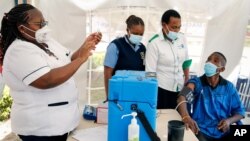The World Health Organization reports the African continent is lagging in the race to vaccinate its people against the deadly coronavirus. WHO says Africa needs far greater access to COVID-19 vaccines to reach its goal of vaccinating 60 percent of the population by June 2022.
Africa received its first delivery of vaccines from the COVAX vaccine-sharing facility a month ago. Health officials say this has kick-started robust vaccination campaigns throughout much of the continent.
Richard Mihigo is an immunization and vaccine development program coordinator at the WHO regional office for Africa. He says 32 countries currently are vaccinating high-risk groups against COVID-19. So far, he notes, nearly 7.7 million doses have been administered.
"This is, indeed, a good start, even if the continent has received only limited doses and much later than other regions of the world," Mihigo said. "The momentum that has started must be kept up to widen the scope of COVID-19 vaccination beyond the high-risk groups that have been prioritized by many countries.”
Mihigo warns this will not be possible unless vaccine equity becomes a reality. He says it is unfair for some high-income countries to vaccinate their entire populations, while ignoring the needs of poorer nations.
WHO estimates Africa will need 1.5 billion vaccine doses to protect 60 percent of the continent’s 1.2 billion population by June 2022. Another challenge facing Africa is the new coronavirus mutant strains.
Mihigo says at least 15 African countries have reported the presence of variant strains. He says it is important to monitor the evolution of the new strains and to maintain public health measures, such as masks and social distancing.
"All the measures that were proven really effective in preventing transmission should continue to be done," Mihigo said. "… By increasing the vaccination capacity, we will put less pressure on the virus and avoid its mutation, as we have heard. So, this is the only solution that we can have to get out of this situation.”
Mihigo says WHO is exploring different ways of boosting the vaccine supply through the COVAX facility. One possible solution he says is to collaborate with rich countries and test their willingness to share surplus doses with Africa. Another is to promote technology transfer and reduce intellectual property barriers, so vaccines can be produced locally.




